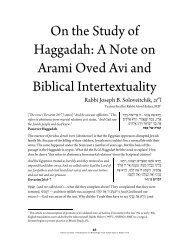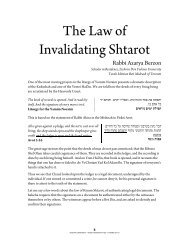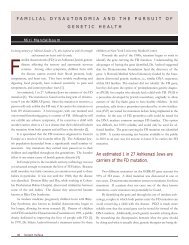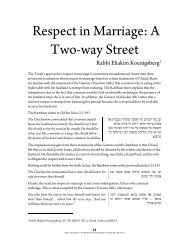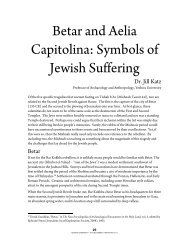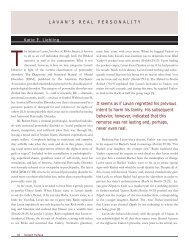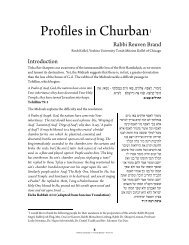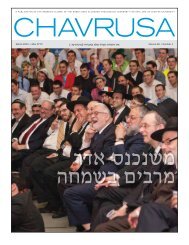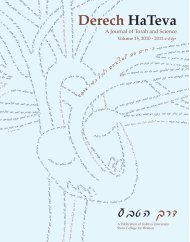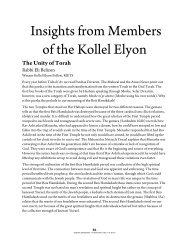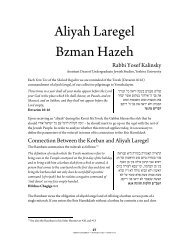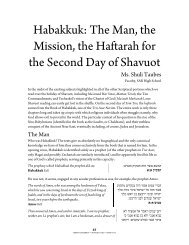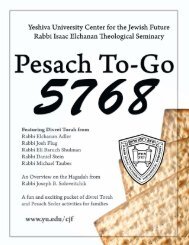YESHIVA UNIVERSITY • SUKKOT TO-GO ... - YU Torah Online
YESHIVA UNIVERSITY • SUKKOT TO-GO ... - YU Torah Online
YESHIVA UNIVERSITY • SUKKOT TO-GO ... - YU Torah Online
You also want an ePaper? Increase the reach of your titles
YUMPU automatically turns print PDFs into web optimized ePapers that Google loves.
fulfillment of the first mitzvah. Granted we cannot require that the “mitzvah-traveler” run<br />
around trying to find a Succah, nor that he expend the major effort necessary in building a<br />
Succah. That would impinge on his ability to fulfill his mitzvah. But if there is a Succah there in<br />
front of him, surely he would be obligated to dwell therein. Conceptually, we can say that while<br />
he has the obligation of the mitzvah-act of dwelling in the Succah (to the extent that doing so will<br />
not interfere with the performance of his mitzvah), he is exempt from the obligation to obtain a<br />
Succah. The non-mitzvah traveler on the other hand, with his limited exemption, is obligated to<br />
obtain a Succah when off the road and at rest, which will likely mean that he must build one.<br />
The Meiri disagrees with that opinion, and presents a different opinion:<br />
In our opinion one who is on his way to perform a mitzvah is exempt<br />
from the act of dwelling in the Succah even if doing so entails no effort<br />
on his behalf, i.e. even if he has simple access to a Succah. The traveler,<br />
on the other hand, although obligated to dwell in a Succah if he has<br />
access to one there at his inn, is not required to expend energy to try to<br />
find a Succah and certainly is exempt from making the effort of building<br />
a Succah.<br />
12<br />
<strong>YESHIVA</strong> <strong>UNIVERSITY</strong> <strong>•</strong> <strong>SUKKOT</strong> <strong>TO</strong>-<strong>GO</strong> <strong>•</strong> TISHREI 5771<br />
הוצמ רבדלש םישרפמ ונא<br />
ןכ םהל תנמוזמ הכוסב ףא<br />
בויח םש ןיא תושרה רבדלו<br />
םוקמב הכוס םש שישב אלא<br />
םיבייח והיש אל םתיינח<br />
הלחתמ התושעל<br />
Thus with regard to the non-mitzvah traveler, the Meiri establishes a difference between<br />
obligation a) to “obtain” the mitzvah object, i.e. the Succah, and obligation b) to implement the<br />
mitzvah-act, in this case the act of dwelling in the Succah. The traveler is exempt from a) but not<br />
from b). By contrast, one who is on the way to perform a mitzvah is exempt from both a) and b).<br />
Therefore even if he has simple access to a Succah he need not dwell there.<br />
In sum, the Meiri, like the anonymous first opinion, is operating with a sliding scale. Since the<br />
mitzvah-traveler is exempt from both obligations, the non-mitzvah traveler must be exempt from<br />
one of the two obligations, namely the obligation to build a Succah.<br />
Why does the Meiri exempt the mitzvah-traveler from dwelling in the Succah even if a Succah is<br />
easily accessible? Apparently the Meiri operates with a different definition of the rule that “one<br />
who is involved in a mitzvah is exempt from another mitzvah.” This rule is more than just a<br />
technical one designed to grant priority for the first mitzvah. A rule of this nature can be derived<br />
from svara (logic) and needs no scriptural source. Yet the Gemorah (Succah 25a) derives this<br />
principle from the passage in the parsha of Kriat Shma “and when you go on your way”- this<br />
exempts one who is on the way to perform a mitzvah. This rule establishes a new halachic<br />
exemption (“p’tur”) that completely suspends the obligation of the second mitzvah as long as<br />
one is involved in the first. Hence it matters not whether the second mitzvah will interfere with<br />
the first.<br />
It would seem, however, that this interpretation of the Meiri is incorrect. In an earlier paragraph,<br />
the Meiri defines the nature and scope of the principle that “one who is involved in a mitzvah is<br />
exempt from another mitzvah”. He writes:<br />
The principle that “one who is involved in a mitzvah is<br />
exempt from another mitzvah” only applies if engaging<br />
ןמ רוטפש הוצמב קסועב ונראיבש לכ<br />
וא הב קסוע אוהש דועבש השוריפ הוצמה<br />
יאש<br />
ול תנמדזמה תרחא הוצממ רוטפ הב דורט



